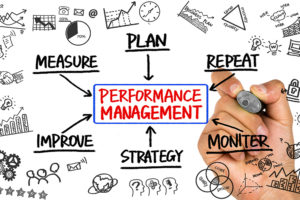Six HR Metrics to Quantify and Track Manager Effectiveness
Like coaches in sports and leaders in the military, your company’s managers can drive the whole company to success or failure. Even with highly experienced managers, stereotypes like Bill Lumbergh in “Office Space” exist for a reason. More than ⅓ of employees have considered quitting their jobs because of new, inexperienced managers (source: Bloomberg) Employees […]
Read ArticleUnderstanding 9-Box Reporting for Performance Management
Employee reviews need to accurately judge an employee’s recent performance as well as future potential. An easy framework for combining these two critical metrics and sorting employees into categories is a simple 9-box grid. Some judgment calls involve a lot of potential for bias and subjectivity, but clearly defined metrics can make assessments more fair. […]
Read ArticleTips for Setting, Measuring, and Tracking Employee Goals
Vague goals, like New Year’s resolutions, are easily forgotten. A resolution to “get healthy” might not last a week while you debate investing in a gym membership. Likewise, employee goals need even more detailed structure than fitness goals, including measuring and tracking progress. How can companies ensure employee goals are not only appropriately set, but […]
Read Article7 Must-Haves for Successful Employee Review Process
Your company’s employee review process says a lot about your company culture. Reviews aren’t just a designated time to tell workers how to improve their performance. Rather, the employee review process has the potential to improve employee engagement and overall company culture. It is easy for the employee review process to veer off-course: With HR […]
Read ArticleDiscover the Benefits of Performance Management Software
Performance reviews have been a staple of businesses everywhere for decades. Unfortunately, despite their consistent presence in workplaces, the review process itself has grown stale. For many businesses, performance reviews occur once a year. The dread is placed upon employees and managers alike, often yielding inaccurate data and a failure to enact any real, positive change. But […]
Read Article6 Effective Tips for Managing Underperforming Employees
The American workforce has undergone a seismic shift in the past few years. When it comes to performance, underperforming employees present a special challenge. How can HR and managers address and improve the work of underperforming employees with Performance Management software? Communicate regularly The first thing to assess is the frequency of your communication. For […]
Read ArticlePerformance Management: Collecting and Utilizing The Right Employee Review Data
Performance reviews might seem simple and self-explanatory at first, but they require careful preparation beforehand and detailed analysis afterward. Team leaders might feel they know which employees are doing better than others (and they’re usually correct), but it would be dangerous to improvise reviews without objective performance metrics to guide the discussion. When performance management […]
Read ArticlePerformance Management: Adapting the Employee Review Process for Remote Teams
Employee reviews are essential for improving the efficiency of teams and departments across the company. It’s easy to find tips for conducting employee reviews in the office (including the one we just wrote), but how should the process be adjusted when employees and management are working remotely? If your teams have recently adjusted to remote […]
Read ArticlePerformance Management: 7 Ways to Improve Your Employee Review Process
An unsettling trend has emerged in the business world that has seen performance reviews unceremoniously fall by the wayside. But with the right Performance Management technology, performance reviews can be built for a modern, more integrated workforce and prove even more beneficial than before. On the one hand, it is easy to see why this […]
Read ArticleWhat You Need to Know Before Disciplining or Terminating an Employee
May 14, 2019 Written by the HR Pros The prospect of corrective action or termination makes a lot of managers nervous. That’s understandable. For employees, being disciplined or losing their job can be anything from moderately embarrassing to financially devastating, but it’s rarely a happy occasion. For the employers, these actions always come with some […]
Read ArticleWhen Employment Is Impersonal, Courtesy Goes Out the Door
March 21, 2019 Written by the HR Pros In December, The Washington Post reported on an odd, eyebrow-raising phenomenon in the working world: employees are “ghosting” their employers. If you’re unfamiliar with the term, ghosting is an unfortunately common practice in the dating scene. It occurs when someone breaks off a relationship without warning or […]
Read ArticleCan You Handle Our Truth: Tips for Managing The Life & Times of A Chaotic Employee
October 25, 2018 It’s getting hectic in here, it’s getting chaotic…. We’ve all been there. You know that time when our personal lives are simply overwhelming. Be it relationships, kids, or what have you – sometimes life can become chaotic. But what do you do when an employee brings that chaos to the workplace? Spotting […]
Read Article








